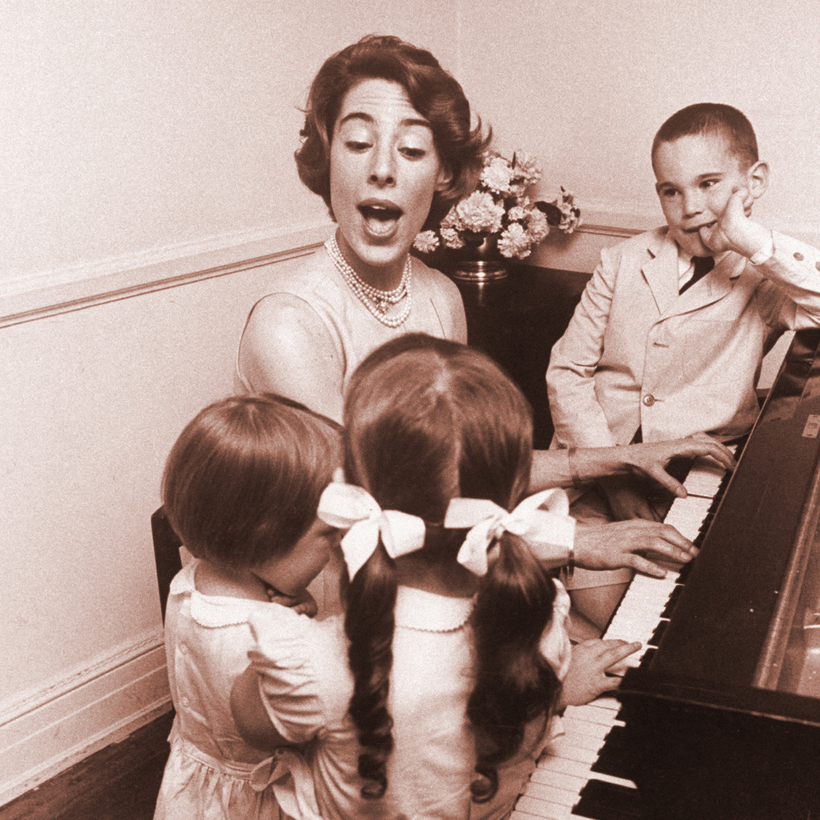In any other family, she would surely have taken the “most talented” award in a walk. But Mary Rodgers (1931–2014) was the daughter of Richard Rodgers, the legendary composer, who, in Noël Coward’s inimitable phrase, “positively peed melody,” and the mother of the Tony-winning composer Adam Guettel.
A bridge between those two musical-theater grandees, Mary wrote the tunes for the 1959 hit Once upon a Mattress, among other shows, then, in a career pivot, the 1972 children’s novel Freaky Friday, as well as the subsequent screen adaptation. Act III: she became an arts patron and chairman of the board at the Juilliard School.
There’s more, and Mary tells it in her delectable, posthumously published memoir, Shy. (The title is a reference to a song from Once upon a Mattress.) In part a chronicle of life with father, in part an insider’s view of Broadway during a golden age, Shy is, most compellingly, an account of a woman finding her power and her voice.
It was a challenge from the jump. “Daddy,” a world-class philanderer, an alcoholic, a depressive, and, yes, sure, a genius (whose work took precedence over everything and everybody), and “Mummy,” the chilly, valetudinarian Dorothy, were a tough—captious—audience. There was always something about Mary that was problematic, including her smile (too broad), her laugh (too loud), and her weight (too high). “You are so fat,” Dick told her, “that your arms swing out on either side like an ape.”
“What I wanted, desperately, was my parents’ affection but it wasn’t there to be gotten,” writes Mary, who quickly learned the utility of a stiff upper lip. Never let them see you cry. Even better, she thought, do not cry at all. She often fantasized about being adopted by Daddy’s collaborator, Oscar Hammerstein, and Hammerstein’s wife. Not that “Ockie” was exactly Father of the Year.

Still, there were compensations. Dick Rodgers gave her music. Early on, he created ear-training games, challenging her to identify intervals and chords. Later, he taught her to play “Chopsticks” and the first eight bars of “Why Can’t I?,” and took her to orchestra rehearsals for his shows. She also found sustenance—though not quite the kind of sustenance she was hoping for—in her friendship with Stephen Sondheim, whom she met when she was 13, and who later became a collaborator.
Mary puts it all out there: her complicated relationship with her younger sister, Linda; her struggles to be taken seriously as a composer (and, let’s be clear here, to take herself seriously as a composer); her distaste for some of her father’s songs, among them “We Kiss in a Shadow” and “I Have Dreamed,” both from The King and I.
Fie, too, on the “praying larks” and that other signature tune from The Sound of Music. “I remember thinking that ‘Do-Re-Mi’ was just silly,” she writes. “‘Do, a dear [sic]’? ‘Fa, a long, long way to run’? What is that? Of course, what else are you supposed to do with the spelling of those notes, but Jesus.”
Mary is similarly open about her first marriage, to Jerry Beaty, the father of her three eldest children, a closeted gay man who, she writes, was physically and emotionally abusive, and about her subsequent active social life. She dated, among others, former C.I.A. operative Cord Meyer, who, she claims, almost raped her, and briefly considered tying the knot with Sondheim (who was gay), and with the brilliant, bisexual (but mostly gay) lyricist Marshall Barer, her collaborator on Once upon a Mattress.
You’ve got to hand it to dear old Daddy; he sized up the situation pretty well. “Why,” he asked, “don’t you go all the way and just marry Truman Capote?”
At some point, Mary came to her senses. Thus, a long, seemingly happy marriage to Henry Guettel, a film executive and, for a time, the head of the Theatre Development Fund, with whom she had three more children. The eldest, Matthew, died, at three, of pulmonary edema. “I cried. Not much though,” Rodgers writes. “I never saw what that would do.”

As befits a showbiz memoir, some well-known people are filleted. Among the shiterati: Bill Cosby, Barbara Barrie, playwright Emlyn Williams, and the endlessly viperish playwright-screenwriter Arthur Laurents. The best that could be said of him was that his longtime partner, Tom Hatcher, was worse.
Leonard Bernstein, who hired Mary as one of his assistants on the CBS series Young People’s Concerts, gets his own special place in hell after he trashes Sondheim’s Sweeney Todd. “Disgusting. Enough to make you want to throw up in your galoshes,” he said of his West Side Story collaborator’s Grand Guignol masterpiece. “Appalled at his obvious envy let alone treachery, I must have been staring daggers,” Mary writes. Nonetheless, Lenny fired off another round: “I guess Steve finally got to write a musical that suits his temperament perfectly.”
Shy has been expertly assembled by Jesse Green, the chief theater critic of The New York Times, from a series of interviews with Mary. Less pleasing are the myriad annotations. While it’s useful to learn the particulars about, say, D. D. Ryan (a photo editor at Harper’s Bazaar in the 1950s) and about the Songs of the Auvergne, Green sometimes comes off as the boorish guy who won’t let you finish telling a story because he’s sure he can tell it faster and funnier.
Never mind. Shy is wonderful, and so is the unassuming Rodgers. “I didn’t expect to be my father—who could?” she writes toward the end of the book. “I never dreamed of equaling Steve. I wasn’t jealous … of Adam’s talent as it emerged—how could I be? It was enough, with all of them, to have had a front-row seat.”

Joanne Kaufman is a New York–based journalist and critic


